Journal of Tourism & Hospitality
Open Access
ISSN: 2167-0269
+44 1300 500008
ISSN: 2167-0269
+44 1300 500008
Review Article - (2019)Volume 8, Issue 5
The paper demonstrates the lack of implementation of quality standards in hospitality industry in Ionian Region. Hospitality industry in our days is one of the important parts of the global economic revenue dominated by high competition. The tourist market demands for better quality services while European regulation promotes the conformance of enterprises to a standard series of facilities. The research is primarily concerned with the need for the hospitality enterprises in Ionian region of Greece to adjust in a continuous competitive tourist environment and examines the representation of knowledge, implementation and conclusion from practice, during the certification procedure of a quality system. The information on the advantages of quality standards is the new challenge as presented in this project. This research showed that the vice majority of hotels ignore the existence of quality standards while a small part implements them.
Hospitality industry; Quality standards; TQM; Ionian hotels
The importance of hospitality industry to the global economy and the introduction of new competitors leaded to hard competition. The role of the hospitality industry is an important part of the global economy. A significant percentage of global growth and employment is linked to the tourist industry. During the summer season an important part of the growth economies (tourist agencies, airports, airlines, ports, ferries etc.) provide services regard to the tourist industry. 47.4% of Europeans tourists prefer the Mediterranean coastal areas for their vacation [1]. Especially in Greece the actual annual number of tourists (30 millions) exceeded multiples the population of the country (10 millions) and the predictions for the next decades’ future trend are optimistic [2].
Greece is famous for its natural beauty and the tradition in hospitality and Ionian region is one of the most popular destinations in Europe [3]. The Ionian region represents one of the main destinations of hospitality in Greece. With its beautiful natural beauty and its advantageous geographic area affect the locus of transition as a bridge between Europe and Greece [4]. The tourism is characterized by strong seasonality with deep influence to the domestic economy - high employment in summer and stagnation during winter [5]. This elevates the great importance of tourism to the domestic economies.
In the last decade new developing countries hit the tourist market with luxury hotels that provide a great variety of services. These countries exploit the advantage of low labor cost and initial investment and attract investors to build hospitality enterprises. Moreover, classic competitors of Greece like Spain, over the last decade have increased the level of the quality services [6]. The lack of quality in the services provided from the Greek hotels is believed to be the main reason for the loss of the leader in European tourist market the last two decades.
According to Greek legislation hotels and apartments are obliged to operate within two categories. Each category of stars (for the hotels) or keys (for the apartments) must satisfy one series of criterions. Law 3190/2003 ratifies the Law 3105/03 (Greek Legislation Code, 2003) giving the right of certification to the “National System of Tourist Certification” an organization created by the Greek Organization of Tourist (E.O.T.), the Hotel’s Chamber of Greece and the Ministry of Tourist in Greece (Greek Legislation Code, 2003) [7,8].
Although there are plenty of definitions of quality we can accept that Quality is often used to signify “excellence” of a product or service [9]. The main focus of Quality is meeting the customer requirements and this can be achieved with a degree to which a set of inherent characteristics fulfils requirements [10]. One way to implement quality is through Quality Management Systems (QMS). For the quality and safety in hospitality industry we met the implementation of ISO 9000: 2000, ISO 14000, O.H.S.A.S. 18001 and H.A.C.C.P. (Hazard Analysis Critical Control Points) specified in quality and safety of food [11].
Exploring the degree of implementation of quality models in the hospitality industry of Ionian region is the main concern of this research. This research explores the quality systems were implemented by the hotels in Ionian region, the relation with the quality standards and the classification into quality standard models. The knowledge of those quality systems, the possible degree of implementation and the finding of these quality standards models applied by the hotels of Ionian region are the three hypotheses of this research.
The research aim was achieved through two main objectives. Firstly, with the integration of a qualitative study in order to reveal the pitfalls and benefits of quality and safety standards through their implementation in the hospitality industry. Secondly, by carrying out an empirical investigation on quality and safety standards related to the knowledge, the implementation and the conclusion from this practice. Ionian region is still one of the most important parts of hospitality industry in Greece and maintain a great interest from guests during the summer. These are the main two reasons for the selection of Ionian region as the application place of the research. This research has the ambition with its conclusions to improve the knowledge about the quality already provided and the future intentions of the hospitality organizations in Ionian region.
The need for quality standards seems to be essential for future profitability. The continuous increase of competition in hospitality industry is one of the great problems that Greek economy faces. The quality of the services provided by the hosting companies is a competitive advantage of both the hotel industry and therefore of the Greek economy based on the hospitality industry [12,13]. On the other hand, the quality of tourist services in the Greek tourism industry is controversial Sigala & Christou, varied and undoubtedly low in certification. The applicability of quality standards in hospitality industry seems to be unknown. That’s one of the ambitions of this research [14].
Exploring the implementation and the usability of quality standards in hospitality industry of Ionian region is originality and the main concern of this research. This research probes the degree of implementation of quality standards in hospitality industry of Ionian region aiming at measuring the quality of tourism hosting services. The knowledge of the quality standards, the possible degree of implementation and the finding of these quality models applied by the hotels of Ionian region are the three hypotheses of this research.
A big part of the literature on quality in the hospitality industry discusses the quality service and introduction of Total Quality Management (TQM) in the Greek hotels. It is hard to find a research about what is happening to the hotels of the Ionian Islands and so this was a good point for the focus of the research. Of great interest is the use of ISO 9000: 2000 in the hospitality industry and the possibility of Integrated Management Systems [15]. Many articles negotiate with the definition and overview articles on quality service in the hospitality industry and/or comparisons of quality cases in different hotels [16,17].
The development of sector based quality assurance standards in the UK leisure, hospitality and food industry drew conclusions on the extent that the various standards can be aligned [18]. The precious knowledge is ready to implement in small tourism enterprises giving benefits and advantages of ISO 9000 system arise from the company’s conformance to critical success factors [19]. The obligatory arise from the Greek legislation [20] enter ISO 9000 as the key to adjustment for the small tourism enterprises covering the great part of the total hospitality industry.
On their road to business excellence Greek enterprises appear to have a low utilization of the award as a marketing tool and as a means of penetrating and/or compete new markets [21]. On the other hand, one significant part of hospitality enterprises in Greece and the Ionian region see certification alone as the only aim, a very dangerous pitfall of quality certification. ISO 9000 certification alone has little or no explanatory power of organizational performance in hospitality industry [22]. ISO 9000 certification of hospitality organizations, enhance quality and efficiency, improve communications, achieve competitive advantage and an increase in market share, reduce cost and achieve a higher stock price. A system is defined as a group of interaction, interrelated or independent elements forming or regarded as forming a collective entity. A system consists of elements that require a consistent set of guiding principles. The success of one element influences the success of the others and vice versa.
The key element of a good safety program is the efforts to modify and encourage behavior. The behavioral hierarchy concept has constructed by some behavior theorist [23]. Based on Figure 1 each item to the left must be chronologically in place before the item on the right can be effective. It will be almost impossible to implement safety management systems if employee safety is not valued as part of the corporate culture.
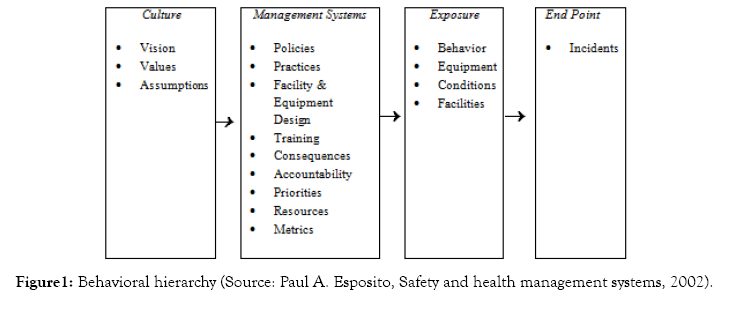
Figure 1: Behavioral hierarchy (Source: Paul A. Esposito, Safety and health management systems, 2002).
The National Certification System in Greece sets the standards (ELOT, 1997) of ISO regulation. The demands of the regulation must be satisfied by the whole number of the certificated enterprises in Greece. The regulation guides planning and selection of the materials, education of the employees and measuring the results [24].
The intent of ISO 9001 is to promote the adoption of the process approach to manage effectively an organization [25]. The result is that the internal audits need to adopt a similar approach. The global establishment of ISO 9000 series brought many other quality assurance standards that have been set forth at a national or international field [26]. ISO 9000 series of quality assurance standards comprise: ISO 9000, ISO 9001, ISO 9002, ISO 9003, and ISO 9004 [27]. The most well-known followers of ISO 9000 series are QS 9000, SSM, EFQM. the criteria of Baldridge Award in USA, Deming Prize in Japan and the very popular in automotive industry QS 9000 series of Action Group in USA. In Greece, ELOT sets the regulation for the certification of enterprises in ISO 9000 quality standard series (ELOT, 2005).
Quality standards
ISO 9000 certification used to be seen as bureaucratic, officious and complacent [28]. Many organizations see ISO 9000 as an end in itself while others consider it to be the first step towards Total Quality Management [29]. Tourist enterprises should pursue ISO 9000 certification in order to enjoy both operational and marketing benefits [30,31].
Total quality management sets three standards (quality, environment, health & safety) essential for the effective operation of the certified enterprise [32]. The three quality standards - ISO 9000, ISO 14001, OHSAS 18001 - contain the same basic disciplines and a general common structure that can be integrated quite easily [33]. The combination into an Integrated Management System (I.M.S.) achieves cost minus, plus a beneficial effect on the culture of the organization because of isolation elimination and more team ethic between the various functions. Instead of three separate system assessment to achieve and maintain certification in quality and safety, an organization needs only one, cutting the cost of external audits by a third [34].
Environment quality standards
An Environmental Management System (EMS) is a framework that allows an organization to consistently control its significant impacts on the environment, reduce the risk of potentially costly pollution incidents, ensure compliance with environmental legislation and continually improve its business operations [35]. ISO 14001 is an international accepted system that defines the requirements for establishing, implementing and operating an EMS and provides confidence to the stakeholders of the certified organization [36].
The ISO 14000 quality standard which began to be implemented some years later than ISO 9000, is spreading at a much greater speed and with the same pattern of growth. Currently ISO 14000 reached almost the same relative level as ISO 9000 and is forecasted to 95 per cent saturation in 2006 [37,38]. Beyond that, ISO 14001 specification establishes a common international environmental language for global environmental progress [39]. ISO 14001 provides better environmental care, more consistent compliance with laws and regulations and better performance from their systems and operations.
The ISO 14000 quality standard which began to be implemented some years later than ISO 9000, is spreading at a much greater speed and with the same pattern of growth. Currently ISO 14000 reached almost the same relative level as ISO 9000 and is forecasted to 95 per cent saturation in 2006. Beyond that, ISO 14001 specification establishes a common international environmental language for global environmental progress. ISO 14001 provides better environmental care, more consistent compliance with laws and regulations and better performance from their systems and operations.
The usefulness of ISO 14001 sets to four factors [40]. Implementation of ISO 14001 builds a worldwide consensus that there is a necessity for environmental management and certification to environmental systems. ISO 14001 improve environmental performance. ISO 14001 facilitate trade and remove trade barriers. ISO 14001 satisfies the need of the market for conformance to environmental protection. In Greek industry, most critical factors for ISO 14001 implementation seem to be enhancing the organization’s image, improving quality, reducing production cost and showing care for the environment [41]. The last decade hospitality industry faces the need for conformance to Greek regulation - after harmonization to EU legislation that demands effective output management of hotels [42].
Health and safety quality standards
A comprehensive food safety strategy involves establishing management goals, food safety objectives and for production systems, performance objectives and performance criteria [43]. The guidance for each step of the process should validated for their effects before integration within a specific HACCP plan [44]. The trend in hospitality industry is the need for certification of food process in quality standards that insure the prevention of food safety problems [45]. With the HACCP based program in base, government, consumers, food retailers and processors achieve to place the tool that determines the conditions that are critical to ensuring the safety of the food produced and serviced to the public [46].
An Occupational Health and Safety Management System (OHSMS) is a framework that allows and organization to consistently identify and control its health and safety risks, reduce the potential for accidents, help achieve compliance with health and safety legislation and continually improve its performance [47]. OHSAS 18001 is helpful to design, implement and operate an integrated quality, environmental and occupational health and safety management [48]. Certification to quality and safety integrated information systems increase the returning of the stakeholders of the certified enterprise [49].
Finally, there are a number of articles that deal with the assessment and successful implementation of current practices of quality management in hospitality organizations. The means uses are questionnaire surveys or case studies and illustrates how quality systems can create a competitive advantage to the organizations related [50].
The need for data collection leaded to the need for an empirical research. This need was covered with the use of a questionnaire. Moreover, the collection of new data from public principles provided additional data to the completion of the research.
This empirical research used the method of surveys, a procedure through the development of questionnaires and/or interviews. For the completion of this research were used three different techniques. The questionnaire was used for the collection of the data from the tested sample of Ionian hotels. The internet searching was used for the collection of cases and references according to the regulation and implementation of Quality standards. The collection of information from public principles was used to discover the existence of legislation in Greece and in Europe for the quality standards in the hospitality industry.
The data were systematically collected from the participants through e-mails. The method of online survey was chosen to conduct the research. The key features that helped in choosing the online survey method is the direct communication with the entire sample concerned in the Ionian islands with comparatively low cost, the large number of users of social networks, the use of digital mail from the entire sample concerned, the confidential nature of online questionnaire completion, the easy-to-use process of completing the questionnaire and the possibility of online problems solving during the process. This research was conducted using the questionnaire technique through online survey method, the collection of data began in the first half of year 2016 and was updated with enriched data from the second half of year 2018.
Questionnaire data collected online were processed with SPSS 22.0 software. A one-way analysis of variance was performed. Multiple-character comparisons were performed using the LSD, Tukey, Bonferroni and Scheffe methods. The level of statistical significance was determined at 0.05 while a homogeneity test was performed. Results are statistically significant (p<0.05) (Bonferroni test).
The additional data were systematically collected from the digital platform “diavgeia” through recording of the published decisions of the ministry of development and investment and the ministry of tourism in Greece. The key features that helped in choosing the data collection is the obligation of the public authorities in Greece to publish the total decisions and deeds that affect the regulation of enterprises' operation, the high accuracy of data collection at a relatively low cost, and the easy-to-use process of collecting actions affecting implementation and certification of quality standards.
Quest of decisions was made in accordance with the contents of the ministry decisions as well as the recipients of them. Simple search is done by inserting a keyword in the search field at the top of the homepage “diavgeia.gov.gr”. In the case of searching for a specific decision affecting enterprises' operation in hospitality industry, the user chooses from the right-hand side of the site the choice of the public operator that interests him/her - e.g. ministry of tourism. Accordingly, it may choose the address of a specific public body and search through the information system search engine by typing in the subject the words "quality standards" and "certification".
From the literature review and the collections of data through internet searching, the aim was to collect information and procedure them in a more realistic framework. A survey involves the combination of different techniques such as questionnaires, interviews and internet searching to provide useful conclusions about the sample tested in Ionian region [51].
All the results collected are presented in this chapter. The effort was to present the data with a friendly and attracting way with respect to the real messages arises from the analysis of the data. Apart from the two bases used - the collection of previous researches in Greece and the collection of data through the questionnaire in the Ionian region - additional data selected from public principles. These additional data are presented to the Appendix part of this research.
The certification of Greek organizations to quality standards developed interesting research findings over the last decade that quality is supposed to be essential in a continuous competitive economic environment. This collection of secondary data provides this research with very interesting conclusions that help to answer the research questions. Kotzamani and Tsiotras presented a very interesting series of researches about the implementation of ISO 9000 quality system series in the Greek economy [52]. From them researches have been derived some very interesting conclusions that answer to this research questions.
ISO 9000-14000 standards offer a great opportunity to Greek companies that aim to increase the effectiveness of their internal organizational system and improve their product and/or service competitiveness. But certification mustn’t be the only aim but the means to guide the organization to development of a total quality system.
Most Greek companies seek certification mainly in order to improve their internal operations and products or/and services than to satisfy market demand and pressure [53]. That indicates the need of most Greek companies to make a conscious choice in order to manage their operations that seem to be out of control. In addition, Greek companies seem to show lack of quality culture but the certification to ISO 9000 standards boosts quality commitment offering significant operating benefits [54]. The best winners from quality procedure seem to be the small and medium sized companies. A big part of the small and medium sized companies is active in the hospitality industry.
The implementation of new ISO 9000:2000 quality series in Greek industries promote customer satisfaction assurance and not just product quality assurance [55]. The revised ISO 9000:2000 quality series of standards seem to assist to decrease the acknowledgement of Greek companies to the importance of customer satisfaction through certification of a quality system.
Greek organizations ignore the role of ISO 9000 as an integral part of Total Quality Management, but prefer to implement ISO 9000 to provide confidence to customers. Another conclusion of this research, very useful to this current research, is that European Quality Award seems to be very important to promote quality to an important part of Greek organizations that are unaware of quality systems.
Gotzamani recently argued that certification to ISO 9000 in Greek organizations restructure their quality systems but have a rather low influence to product quality and innovation [56]. Although ISO 9000 have a high influence in the areas of customer service and satisfaction, Greek managers believe that the influence in market share, competitiveness, employee motivation and quality costs, is in fact very low.
The most important reason for the introduction of quality assurance systems in Greek enterprises refers to the certification of external impact (demands of international and/or domestic market) and not to the internal impact (restructure of the organizational structure) [57]. Quality certification and promotion in food from the certified Greek organization, reveals that consumer’s willingness is influenced positive and associated with higher trends for consumption [58].
The implementation of risk assessment - a technique widely used in environmental quality systems - in Greek companies sets an initial numerous of indicators [59]. The certification to environmental systems (ISO 14000 series), improve the measures of the environmental indicators and the quality costs and related with increase to market share.
Apart from secondary data collected to answer the research questions there was a need for new data that would be collected straight from hospitality enterprises of the Ionian region. One of the best research tools to answer the research questions was the creation of a questionnaire. A questionnaire structured in 10 subject questions and sent to a selected sample of hotels. The sample refers to 245 hotels of 3-5 stars (*) according to Greek legislation, placed in the Ionian region. The answers were expected to arrive mostly by e-mail and partly by mail. The most t of them arrived by mail and some of them after personnel call by mail. From the sample of 245 hotels, 132 questionnaires received completed and presented concentrated on Data analysis and represent 53,88% of the whole sample.
The research achieved two important data bases included to the Appendices. After request to the Ministry of Tourism in Greece, a statement received with the total amount of the hotels in Ionian region of 3-5 stars (*). The statement contains the facilities and the quality systems already provided by the hotels in Ionian region. The data declared to the Ministry of Tourism in Greece, the first months of this year. In addition, another statement with the certificated enterprises in quality and safety in hospitality industry from the main organization of quality certification in Greece ELOT, received and is presented to the Appendices.
For the collection of primitive data created a questionnaire, structured in 21 subject questions that use most of them use the likert 5D scale and at last the 21st question is an open question related the answer to the respondent of the questionnaire [60]. The questionnaire was sent to a selected sample of Ionian hotels. The main criterion for the receivers was the hotels to have remarked with 3-5 stars (*) according to Greek legislation and of course to provide all the facilities and presuppositions the law demands [61].
With this criterion a sample of 245 hotels selected from the Ionian area. All these 245 hotels are classified by the Greek law for their facilities and they own remarks for 3 stars (*) or more - according to the data received by the ministry of Tourism in Greece. 245 classified hotels place in the area of Ionian. 135 classified hotels place to the island of Corfu (Kerkyra) which is the most developed to the area of Ionian. 70 hotels place in the island of Zakynthos, 23 hotels place to the island of Cephallonia - that is the biggest at length island of Ionian but not so developed - and finally 17 from the island of Lefkada. The most of them include e-mail that helped this research to the sending of the questionnaires.
The structure of questionnaire separated in 3 parts. In part A collected categorical variables related to the category of the hotel, the provided facilities, the geographic area, the nationalities of the serviced clients and the economic size of the hotel (number of employee). The following Figure 2 presents the distribution of the replied hotels related to the category of stars. From 132 replies 12 hotels classified in category of 5*, 52 in the category of 4* and 68 to the category of 3 stars.
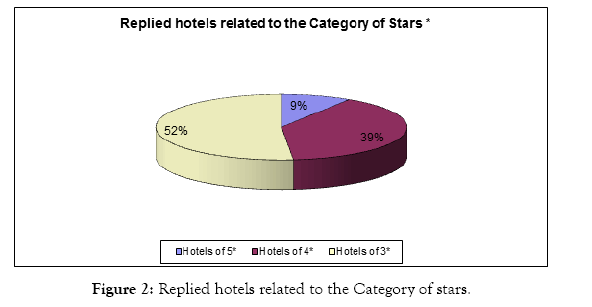
Figure 2: Replied hotels related to the Category of stars.
Although the hotels of five stars are less than the other two categories, in fact these hotels entertain an important part of the total guests. The next Figure 3 classifies the hotels of 5*, 4* and 3* related to the number of rooms.
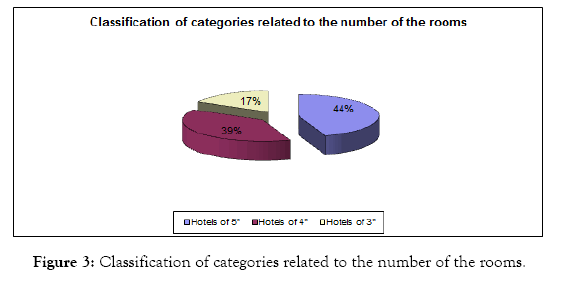
Figure 3: Classification of categories related to the number of the rooms.
From Figure 3 is clear that the biggest part of the tourists in Ionian region (44%) are entertained in hotels of five stars and just 17% to hotels of three stars. From the other side the hotels of four stars are the biggest part of the replied hotels as presented in Figure 2 and entertain a very important part of the whole tourists in Ionian region. Corfu and Zakynthos are the busiest islands in Ionian region. Figure 4 presents the distribution of the replied hotels related to island placed.
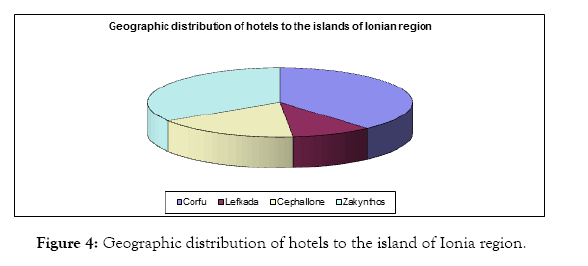
Figure 4: Geographic distribution of hotels to the island of Ionia region.
From part A of the questionnaire raised another important characteristic about the ages of tourists that select Ionian region during the summer destination. The Figure 5 presents the classification of ages in Ionian region related to the category of hotel they select as destination for their holidays.
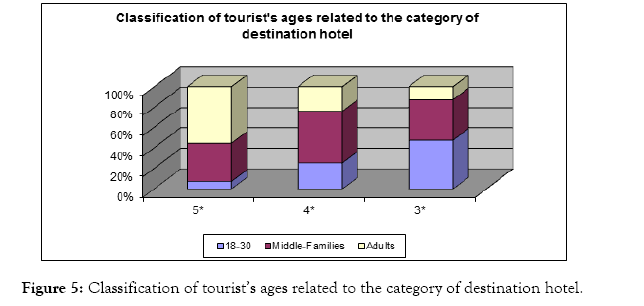
Figure 5: Classification of tourist’s ages related to the category of destination hotel.
Part B is the most important from the questionnaire. This part contains the data that related to the research questions. Table 1 presents the results of the 132 questionnaires received in a concentrated form.
| Objectives (hotels) | Total number | Percent % |
|---|---|---|
| Total sample | 245 | - |
| Total replies | 132 | 100 |
| Implementation of ISO 9000-2000 | 14 | 10,60 |
| Implementation of ISO 14001-2004 | 0 | 0,00 |
| Implementation of ISO 18000 | 0 | 0,00 |
| Implementation of h.a.c.c.p./ISO 22000 | 63 | 47,73 |
| Certified to ISO 9000 | 5 | 3,79 |
| Certified to ISO 14000 | 0 | 0,00 |
| Certified to ISO 18000 | 0 | 0,00 |
| Certified to h.a.c.c.p./ISO 22000 | 6 | 4,55 |
| Knowledge of ISO 9000-2000 | 97 | 73,48 |
| Knowledge of ISO 14001-2004 | 21 | 15,91 |
| Knowledge of ISO 18000 | 17 | 12,88 |
| Knowledge of h.a.c.c.p./ISO 22000 | 91 | 68,94 |
| Implementation of ISO 9000-2000 | 11 | 8,33 |
| Implementation of ISO 14001-2004 | 0 | 0,00 |
| Implementation of ISO 18000 | 0 | 0,00 |
| Implementation of h.a.c.c.p./ISO 22000 | 45 | 34,09 |
| Considerations about ISO 9000-2000 | 19 | 14,39 |
| Considerations about ISO 14001-2004 | 14 | 10,61 |
| Considerations about ISO 18000 | 3 | 2,27 |
| Considerations about h.a.c.c.p./ISO 22000 | 34 | 25,76 |
Table 1: Concentrated form of the results received.
The first column in Table 1 presents the objective examined from the questionnaire. The second column presents the total number of every objective and the last column presents the numbers percent (%) very useful for the analysis of the results. From Table 1 it is obvious the petty number of certified hotels in Ionian region. The final percent of 3,79% of certified organizations in ISO 9000 is almost disappointed. Also the hotels are almost unaware of the existence of other quality systems apart ISO 9000 and H.A.C.C.P.
A better analysis shows that the most hotels give advantage to the implementation of H.A.C.C.P. but the certification is still worthless. In addition, the most enterprises have been informed about the existence of ISO 9000 and H.A.C.C.P. but there is low interest for future implementation. There is a preference for the implementation of H.A.C.C.P. as we can see to the Figure 6.
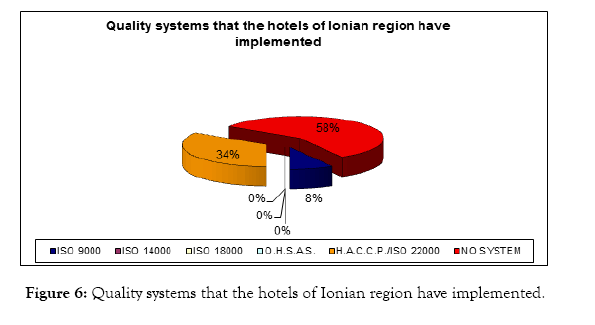
Figure 6: Quality systems that the hotels of Ionian region have implemented.
Although almost all the hotels have achieved conformance to Greek legislation (98.50%), only the 5% percent of the five stars’ hotels have already been certificated in a quality system. This disappointed number of certificated five stars’ hotels shows that in fact the most enterprises gave importance to the quantity of services while the quality of provided services isn’t an important priority.
An important point to insist is that the biggest hotel - five stars’ classification - in the city of Corfu - the most developed in the Ionian region - hasn’t ever been certified in any quality system. In addition, one of the most well-known labels of hotels with two great hotels in the area of Corfu - classified in five stars - and very famous around Europe with hotels in Greece and outside Greece, hasn’t ever implemented a quality system and almost ignore the existence of environmental and safety systems.
The intentions for the future are not so optimistic. From Figure 7 seems that the thoughts for future implementation of a quality system are poor although the 74% of the representative hotels recognize that quality is a competitive advantage and improve operations and profitability.
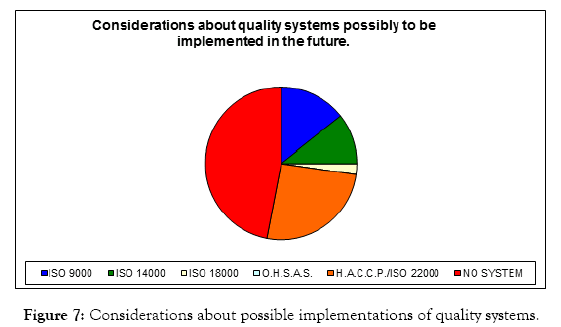
Figure 7: Considerations about possible implementations of quality systems.
The moderate amount of hotels that think for future investment in quality systems - as we can see from Table 1 - presage things will be almost the same the next years. Figure 6 shows that about the half of the hotels don’t think to implement a quality system in the future. The reasons are represented to the Table 2 below. The certification in the hotels of Ionian region is very low. About 10% of the total sample has been certificated to a quality system. From the other side the certification of ISO 14000, ISO 18000 and O.H.S.A.S. is inexistent. Figure 8 represents the low certification of quality systems in the Ionian region.
| Main reasons prevent from future implementation | Total number | Percent % |
|---|---|---|
| Costs | 86 | 65 % |
| Lack of information | 47 | 36 % |
| Lack of knowledge | 55 | 42 % |
| Ignorance | 50 | 38 % |
Table 2: Main reasons prevent Ionian hotel future implementation in quality systems.
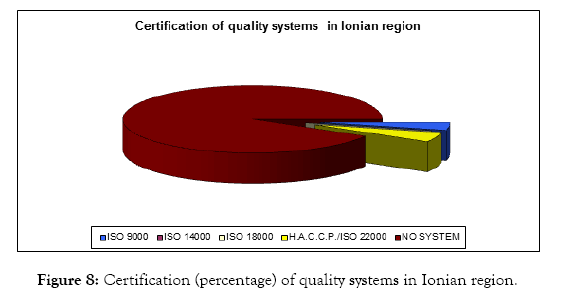
Figure 8: Certification (percentage) of quality systems in Ionian region.
From the part C of the questionnaire collected data about reasons and thoughts for the implementation of a quality system in the hotel. One of the most important data is the reason that the most hotels don’t have plans to implement a quality system in the future. According to the data collected, 74% of the Ionian hotels believe that quality improves profitability and gives competitive advantage. However, the interest for future implementation is very poor. The main reasons prevent Ionian hotels from future implementation in quality systems is presented in Table 2.
Figure 9 represents in percentage the most important reasons that prevent Ionian hotels from future implementation. From Table 2 appears that the most important reason for the absence of future program in quality implementation is the cost of investment. But also considerable is the percent of hotels that have complete ignorance to quality systems. Hotels of Ionian region already worry about the future competition to quality services in hospitality industry. That’s a conclusion results from the analysis of the questionnaires collected and is presented to the Table 3.
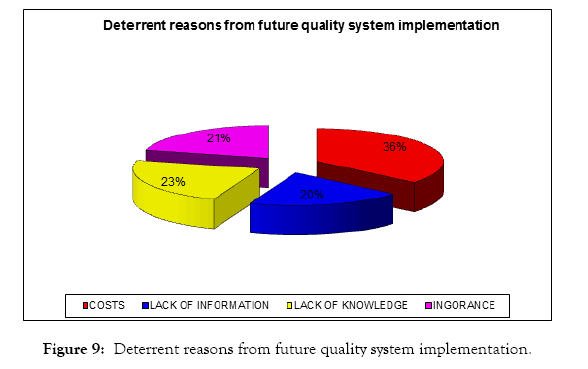
Figure 9: Deterrent reasons from future quality system implementation.
| Objectives | Total number | Percent % |
|---|---|---|
| Hotels implement or think to implement at least one quality system in Ionian region | 68 | 51,51 |
| Hotels implement or think to implement at least one quality system in Corfu | 33 | 64,70 |
| Hotels implement or think to implement at least one quality system in Lefkada | 1 | 7,14 |
| Hotels implement or think to implement at least one quality system in Cephallone | 3 | 9,37 |
| Hotels implement or think to implement at least one quality system in Zakynthos | 31 | 72,09 |
Table 3: Implementation of quality systems in percentage for every island of Ionian region.
From Table 3 appears that almost the half number of the Ionian hotel already implement one quality system (ISO 9000 and/or H.A.C.C.P.), while the most of them haven’t been certified, yet (Table 4). This conclusion shows the worries of Ionian hotel for the future competition in quality. Half of them already implement a quality system, although the weakness to achieve certification, prevent them from a precious competitive advantage to their marketing policy.
| Information about the participation of European sources to the investment on the implementation of quality systems | Total number | Percent % |
|---|---|---|
| Already informed | 73 | 55,30 |
| Complete ignorance | 45 | 34,09 |
| Think/not sure | 14 | 10,61 |
Table 4: Information about the European sources available for quality investment.
From Table 3 seems that the hotels of Zakynthos in almost 72% of the whole sample have already implement or think to implement in a way at least one quality system. From the other side the islands of Cephallone and Lefkada show very low representation and planning to the implementation of quality systems. The lack information appears also to the ignorance of the European Sources for Quality existed. Almost the 55% of the sample ignore them and only 1 to 3 (34%) recognize their existence. Table 4 presents the information about the participation of European sources to the investment in quality systems.
Part C of the questionnaire ends with an open question to the representatives about the thoughts for future investment in quality - after the completion of the questionnaire - and the reasons impede them for a future planning. The most representative admit that they have lack of information about the implementation of quality systems although their acceptance that quality provides competitive advantage. From the other side the most of them don’t have information about the participation of European sources for the certification in quality systems. Even 1/3 of them that are aware of available European source, they don’t feel sure for a future investment in a quality system.
Figure 10 presents a sensitivity analysis related to the percent of the hotels that have implemented or certificated in total quality systems. The results show great conformance in Greek legislation. However, the certification in a quality system is still very low.
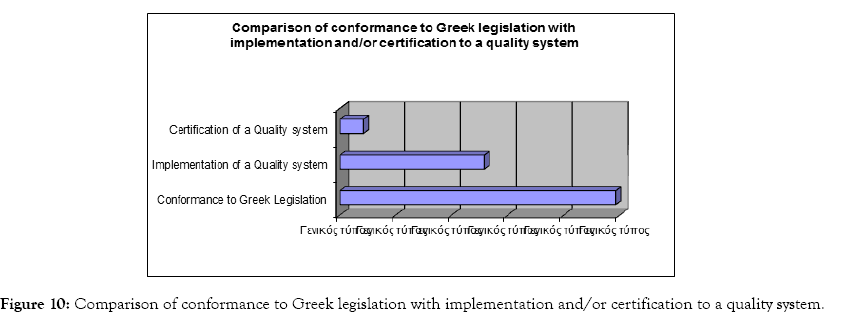
Figure 10: Comparison of conformance to Greek legislation with implementation and/or certification to a quality system.
Data collected showed that those hotels which already implement a quality system recognize the attribution to present and future profitability. In fact, the Ionian hotels already have the implementation experience of a quality system (ISO 9000 & H.A.C.C.P.) understand they have a competitive advantage. From the other hand, the hotels haven’t implemented a quality system - more than the half - can't perceived the need for a quality system. In fact, lack of information in quality advantages left the half of Ionian hotels in quality ignorance.
Ionian region is one of the most beautiful natural places of Mediterranean. Today the need for the protection of natural environment and profitability through standardization to an environmental quality system - ISO14000 - is indispensable more than any time in the past. However, Ionian hotels haven’t consolidated the need for environmental and safety standards. The results from the questionnaire show the absence of any procedure or future thoughts about the implementation on an environmental quality system standard. There is lack even to the implementation of ISO 9000 and H.A.C.C.P. so the need for an integrated quality management system in hospitality industry although essential, in fact it is completely unknown.
From data collected through the questionnaire and the ministry of Tourism appears that the Ionian hotels haven’t perceived the need for certification to quality standards. What surprises most is the lack of a strategy for future investment. Looks that the economic crisis and the increase of competition in hospitality industry the last years have confused the owners of Ionian hotels and the lack of information disorientate them completely. Even most of them appreciate the contribution of quality certification to profitability; certification is a word almost unknown to their plans.
Ionian hotels care about conformance to Greek legislation. But they care in quantity and not in quality. From the data collected almost the 98.5% have achieved conformance to Greek legislation that demands the provision of an important series of services and facilities. Although the investment to essential services, quality certification delays.
Data collected showed that those hotels which already implement a quality system recognize the attribution to present and future profitability. In fact, the Ionian hotels already have the implementation experience of a quality system - ISO 9000 & H.A.C.C.P. - understand they have a competitive advantage. From the other hand, the hotels haven’t implemented a quality system - more than the half - can't perceived the need for a quality system. In fact, lack of information in quality advantages left the half of Ionian hotels in quality ignorance.
Analysis of data collected shows that almost the 75% of Ionian hotels don’t have plans for future implementation of a quality system. From the other hand, about the 75% of the Ionian hotels recognize the contribution of quality to hospitality organizations. The analysis of past researches in Greece shows that quality implementation is possible after essential information, essential technological knowledge, human resource training and last but not least insurance of investment sources. Regarding to the availability of European programs for the finance of quality programs in hospitality industry, the problem concentrates to the lack of information about the advantages of quality certification. The fact that 95% of five stars’ Ionian hotels haven’t been certified to a quality system, although the available services, show the lack of knowledge to the implementation of quality standards.
Regarding the little number hotels that have already implemented a quality system, the need for future implementation is great. The internal and external benefits will be valuable and will offer the sense of quality to the serviced tourist. The analysis of the data collected shows the need for information to quality advantages. For example, only 1 in 10 - around 10,60 % - have experienced the implementation of ISO 9000 in Ionian hotels. Knowing the positive views of most of these hotels for improvement through quality, 65% of the hotels will be open to implement a quality system if they have the proper information.
Even with the best intentions for future quality implementation, the results for quality applicability are disappointed. Only 5% declare to have been certified to a quality system. This result shows weakness to implement and certify in a quality system. The attainability of future certification in quality systems related to the degree of future information of the participants. The Ionian hotels need to be provided information and direction to the applicability and benefits of quality certification. Until today, the public failed to guide the hospitality industry to quality certification. Although the implementation of at least one quality standard from an important part of the sample, certification still delays. But the competition gets harder and the demands from the tourists, even more.
After the analysis of the results the deep thoughts for the conclusions raised. The most important for this research is that after the analysis of the results something new is known about the representation of quality concept in Greek hospitality industry.
Regarding the five research questions of this dissertation about the implementation and certification of Ionian hotels to quality systems, there is a clear conclusion about the low level of applicability of quality standards. The low use of ISO 9000 in Ionian hotels reveals the quality gaps exist and the weakness to correspond to the new competitive global environment. From the other hand, the implementation of H.A.C.C.P. from the half Ionian hotels shows the great importance that give to the provision of quality food. In fact, shows the trends of the last decade that the tourists select to have holidays including meal and/or dinner. The need for quality food forced the half of the hotels to implement the standards of H.A.C.C.P.
In addition, the ignorance to the implementation of ISO 14000 is a surprisingly conclusion. What is important, it’s the absence of any thought for future investment in ISO 14000. Knowing the threats to natural environment in our days seems to be almost irresponsible the non-existence to protect what is the best advantage in Ionian region, its natural beauty. Moreover, the continuous sensitivity of customers for sustainable development, expose the inability of Ionian hotels to operate with the demands of the market. About the same concluded for ISO 18000, the system of quality and safety [62].
According to the third research question, the evidence show that the Ionian hotels adjusted to Greek legislation. But didn’t take the chance to take one step in front and increase the level of quality to the provided services. The adjustment to Greek legislation is a good message that if the information could establish, the Ionian hotels would have a chance to improve the quality of the provided services.
The views expressed by the representatives show the acceptance of quality systems as a tool of present and future competitive advantage. However, there is inertia to take decision and look for sources that will enable the enterprise to implement a quality system. About attainability of future implementation of quality systems what the results shows is that there is need for great effort to the information of the owners of the Ionian hotels to quality competitive advantages.
This research regards to the implementation of quality and safety to the hospitality industry. But the research has certain variable to the time, place and knowledge. The research has certain conclusions and regards to the place the sample of the research represented. For example, there is an absolute difference between what the existence literature and researches found in Greece and what this research concludes in the Ionian region.
Regarding to the quality certification, the results were disappointed about quality certification. The unaware and the lack of information and knowledge presented to be the main reason for the low degree of certification in Ionian hotels. From the other side, the research shows the existence of quality systems mainly in H.A.C.C.P. and so the importance that Ionian hotels give to the quality of provided food. But the low representation to the implementation of ISO 9000 shows the absence of quality thought in the Ionian region. The collection of data through a questionnaire represents the applicability and the implementation of the quality systems in hospitality industry in the Ionian region.
This research investigates the representation of the quality systems in the Ionian region. The procedure was very difficult through to a physical hesitation of Greek enterprises to provide with information about their operation. Although the difficulties this research with hard effort ensures conclusions about the aims of the implementation and the applicability of quality systems in Ionian region.
The author declares no conflicts of interest regarding the publication of this paper.
Citation: Varotsis N (2019) Quality Standards in Hospitality Industry: Ionian Region. J Tourism Hospit 8:417. doi: 10.35248/2167-0269.19.8.417
Received: 10-Oct-2019 Accepted: 21-Nov-2019 Published: 28-Nov-2019
Copyright: © 2019 Varotsis N. This is an open-access article distributed under the terms of the Creative Commons Attribution License, which permits unrestricted use, distribution, and reproduction in any medium, provided the original author and source are credited.